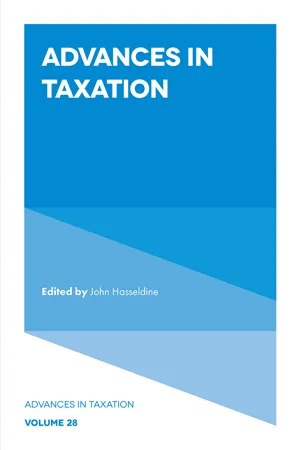![]()
THE RELATION BETWEEN EQUITY INCENTIVES AND EARNINGS MANAGEMENT THROUGH PERMANENTLY REINVESTED FOREIGN EARNINGS FOR US MULTINATIONAL CORPORATIONS
Zhan Furner, Keith Walker and Jon Durrant
ABSTRACT
Krull (2004) finds that US multinational corporations (MNCs) increase amounts designated as permanently reinvested earnings (PRE) to maximize reported after-tax earnings and meet earnings targets. We extend this research by examining the relationship between executive equity compensation and the opportunistic use of PRE by US MNCs, and the market reaction to earnings management using PRE designations. Firms use equity compensation to incentivize executives to strive for maximum shareholder wealth. One unintended consequence is that executives may engage in earnings management activities to increase their equity compensation. In this study, we examine whether the equity incentives of management are associated with an increased use of PRE. We predict and find strong evidence that the changes in PRE are positively associated with the portion of top managers' compensation that is tied to stock performance. In addition, we find this relationship to be strongest for firms that meet or beat forecasts, but only with the use of PRE to inflate income, suggesting that equity compensation incentivizes managers to opportunistically use PRE, especially to meet analyst forecasts.
Further, we provide evidence that investors react negatively to beating analysts' forecasts with the use of PRE, suggesting that investors find this behavior opportunistic and not fully convincing. This chapter makes an important contribution to what we know about the joint effects of tax policy, generally accepted accounting principles, and incentive compensation on the earnings reporting process.
Keywords: Permanently reinvested earnings; foreign earnings; tax incentives; equity compensation; earnings management; earnings surprise
INTRODUCTION
This chapter investigates the relationship between executive equity incentives and the use of permanently reinvested earnings (PRE). We address two primary research questions in this study. First, we examine whether executive equity compensation incentivizes managers to use PRE to improve earnings by reducing the accrued tax expense. We test this relationship generally and then on firms that meet or beat analysts' forecasts. Our test focuses on firms that utilize PRE to meet or beat analysts' forecasts. Second, we examine the market reaction to meeting or beating analyst forecasts with the use of PRE.
Firms are increasingly exposing executive wealth to firm stock in order to align upper management incentives with the interests of shareholders (Ikäheimo, Kallunki, Moilanen, & Schiehll, 2018; Merchant, Stringer, & Shantapriyan, 2018). However, considerable earnings management research finds that managers opportunistically increase earnings to increase the value of stock options and option exercises (e.g., Bartov & Mohanram, 2004; Bergstresser & Philippon, 2006; Burns & Kedia, 2006; Efendi, Srivastava, & Swanson, 2007; Jensen, Murphy, & Wruck, 2004). Managers also seek to meet specific targets such as analyst forecasts to maximize the value of stock-option exercises (Cheng & Warfield, 2005). Designation of PRE requires managers to exercise judgment in the interpretation of both domestic and foreign law and to evaluate both domestic and foreign operating and investment opportunities, among other tax and nontax considerations. The degree of complexity and judgement involved create information asymmetry between financial-statement users and managers. Since designating foreign earnings as PRE is a powerful and effective tool for US multinational corporations (MNCs) to meet or beat earnings targets (Krull, 2004), and the reporting environment is relatively flexible for firms to keep information about PRE designation less transparent to market participants (Ayers, Schwab, & Utke, 2015; Donohoe, McGill, & Outslay, 2012), we hypothesize that when executives of US MNCs have stronger equity incentives they are more likely to use PRE to increase earnings (generally) and more likely to use PRE to opportunistically meet or beat analyst forecasts. Understanding the influence of executives' equity incentives on US MNCs' decision to strategically avoid missing earning targets through the tax accrual is important to accounting regulators and standard setters (SEC, FASB, etc.) for improving financial-reporting standards and to investors for evaluating the earnings quality of US MNCs.
Prior to 2018, US tax law charged a tax on foreign earnings from US MNCs when foreign earnings were repatriated back into the US. Generally Accepted Accounting Principles (GAAP) required that firms accrue a tax liability associated with this repatriation tax (regardless whether foreign earnings were repatriated), unless the US MNC asserted that the repatriation of the foreign income would be indefinitely postponed (FASB ASC 740-30-25). Thus US MNCs may recognize earnings generated by foreign subsidiaries without recognizing US tax on those earnings if management designates foreign earnings as permanently reinvested (PRE). 1 , 2 While designating PRE may signal positive foreign investment opportunities (i.e., high return investments including investments in fixed assets), much of the extant literature documents the prevailing belief that PRE is held overseas by MNCs in the form of excess cash with the primary objective of minimizing the MNCs' overall tax burden (Altshuler & Newlon, 1993; Foley, Hartzell, Titman, & Twite, 2007; Hines & Hubbard, 1990). Krull (2004) documents that US MNCs maximize after-tax earnings and meet earnings benchmarks by deferring recognition of tax expense on PRE. While the designation of PRE allows US MNCs to lower accrued tax liabilities and boost reported earnings, the level of discretion afforded to companies with regard to how they record and disclose the amount of PRE and related tax liabilities is substantially high (Donohoe et al., 2012). Whether executives manage financial-statement earnings by designating foreign earnings as PRE to maximize their personal equity incentives rem...
